All products featured are independently chosen by us. However, SoundGuys may receive a commission on orders placed through its retail links. See our ethics statement.
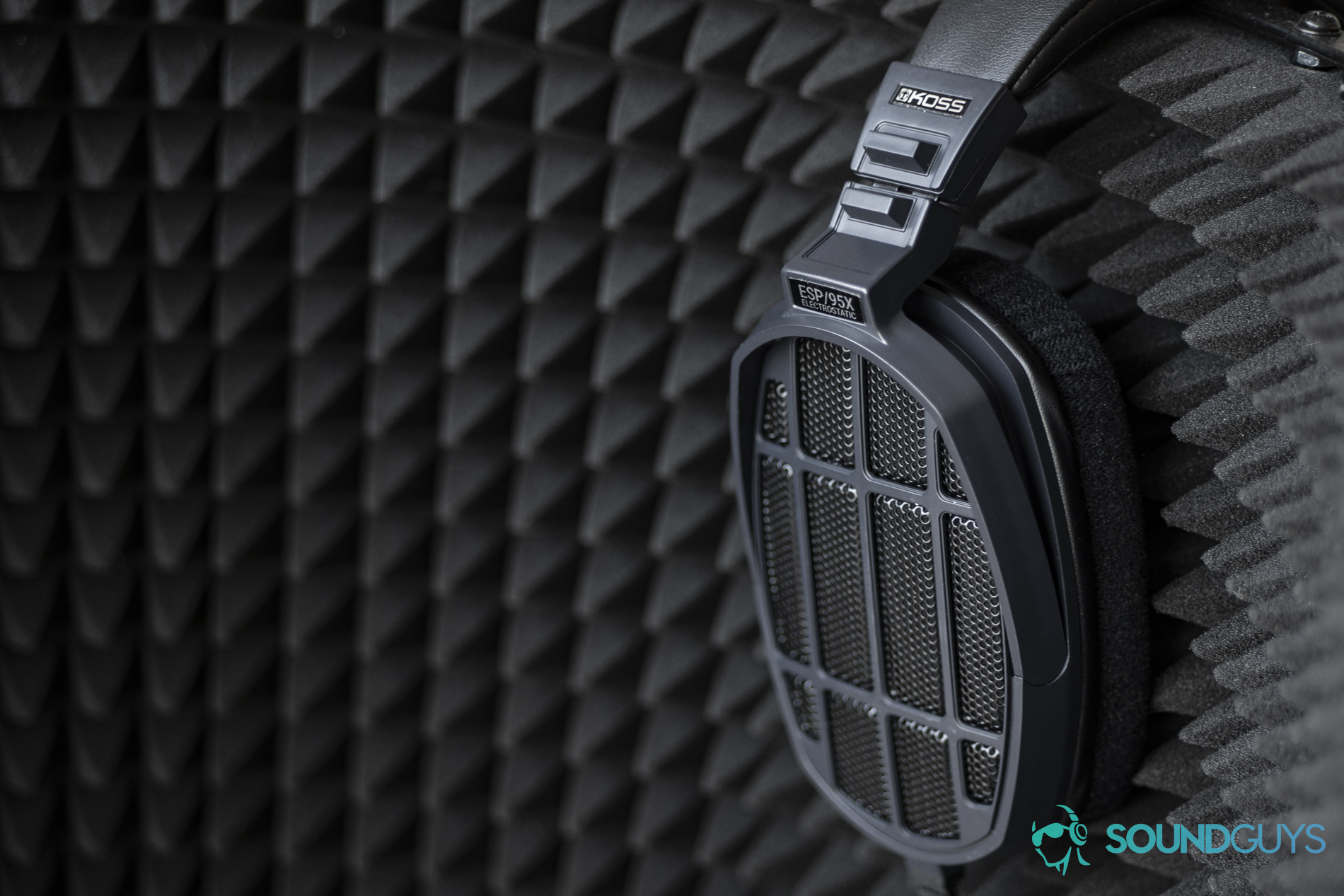
Massdrop x Koss ESP/95X review
January 23, 2020
If you’re chasing audio quality, you’ve probably come across electrostatic headphones in your research. The Massdrop x Koss ESP/95X represents the best value you can currently get online for this technology.
Who is the Massdrop x Koss ESP/95X for?

- Audiophiles looking for an entry point into the world of electrostatic headphones (and don’t want to pay for a STAX-009).
- Music lovers looking for a set of computer headphones will love the Massdrop x Koss ESP/95X.
- People who aren’t podcasting will like the Massdrop x Koss ESP/95X, because if they are: the open backs will leak sound into the mix.
What’s the Massdrop x Koss ESP/95X like?
As far as headphones go, the Massdrop x Koss ESP/95X are probably simultaneously the most cumbersome headphones on my desk and the most comfortable. Through the mess of wires, huge power brick and rather large energizer, the similarly large headphones seem like they might be heavy too. Not so! They’re actually one of the lightest headphones we’ve reviewed this year—earbuds and true wireless models notwithstanding.
The giant, open-backed ear cups and wide fabric pads distribute the already-low weight of the headphones on your skull, easily encompassing your entire ear. This is good for two reasons: not only does it make them insanely-comfortable to use, but it also allows that giant planar-shaped driver to fire sound at your entire ear—allowing for your anatomy to be more easily fooled by the music you’re listening to.
How do you set up the Massdrop x Koss ESP/95X?
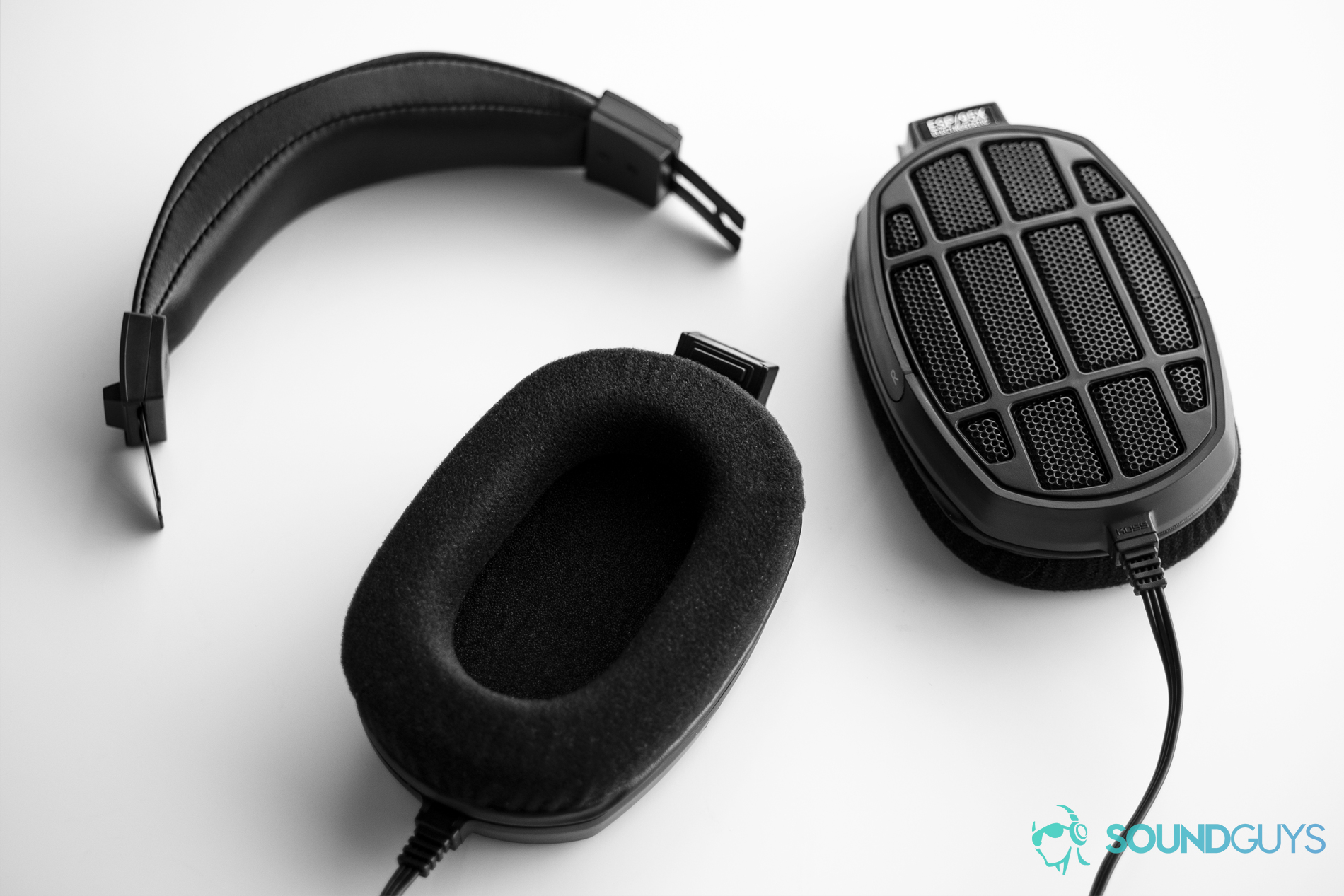
If you just bought the Massdrop x Koss ESP/95X, the first thing you’ll notice is that there’s a fair bit of assembly required. After attaching the ear cups to the band, you’ll find that you now also have to plug in a strange-looking ribbon cable and a power brick to the bulky amplifier-looking box. Said box is the E/90x electrostatic energizer, which is required for all use.
How are electrostatic headphones different than regular headphones?
Electrostatic headphones are considerably more expensive and require the use of an electrostatic “energizer” in order to work. However, the elements that actually create sound are several orders of magnitude lighter than the headphones you currently own.
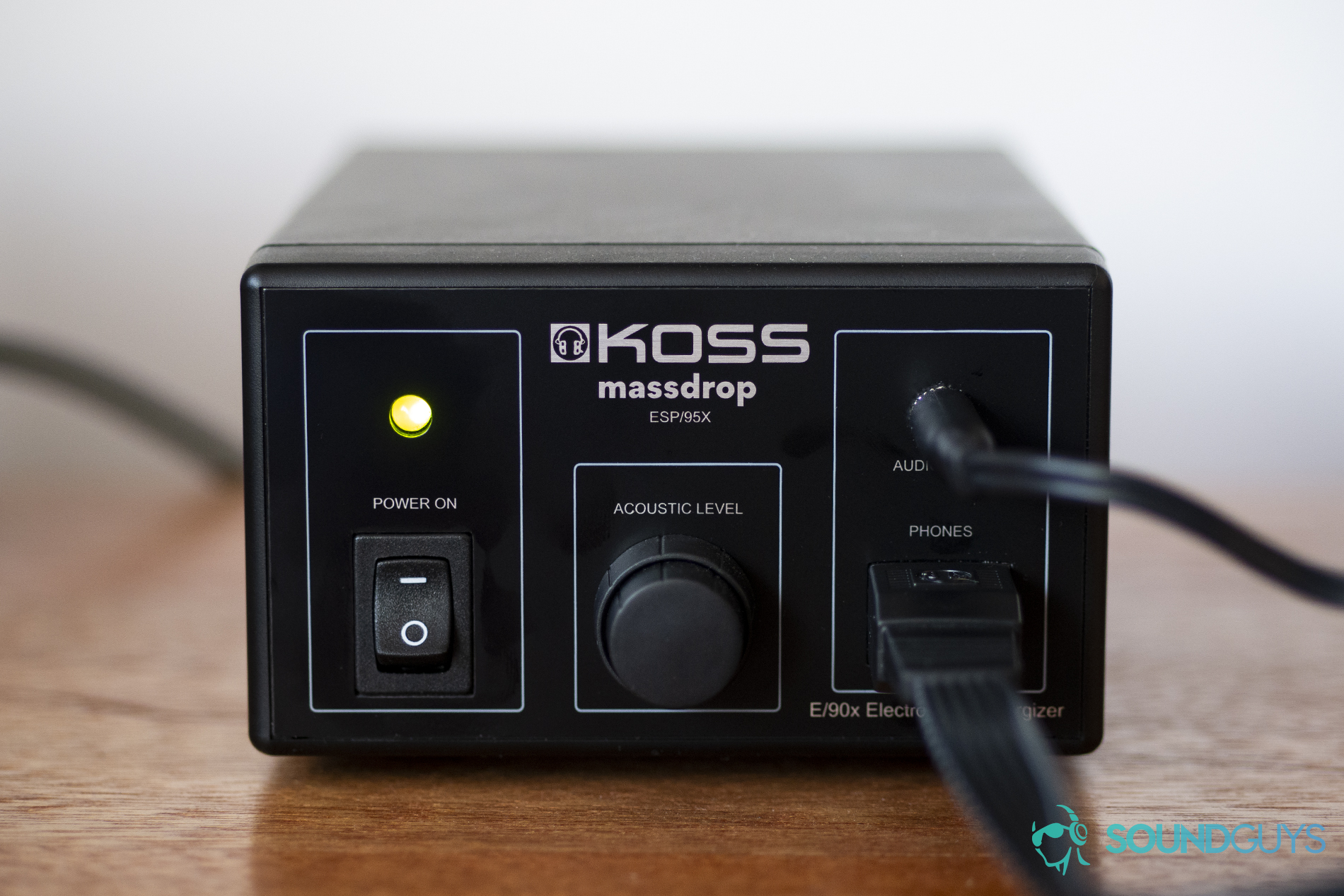
In order to create sound, electrostatic headphones put an electric charge across the surface of a lighter-than-air sheet, which is surrounded by perforated metal sheets that don’t touch anything at all. By changing the electric charge that is applied to the sheet, the whole thing will be pushed and pulled towards either piece of perforated metal, thus re-creating your sound.
If you’ve never owned a set of planar magnetic or electrostatic cans, every set of headphones you’ve ever owned likely works through some iteration of what’s called a dynamic speaker element. This simply means that it moves, with the help of a metal coil and electromagnetism. These speaker elements are based off of century-plus old technology, and while they’re very good: they aren’t anywhere near as good as electrostatic headphones.
This is because dynamic speaker elements will often have (relatively) high levels of distortion due to the fact that they are much bulkier than electrostatic elements. They often introduce harmonic components as a result of physical limitations. We’re at a point in history where these problems aren’t really immediately audible as much as they used to be, but the audio purist will want to invest in electrostatic headphones because they offer a dramatically more distortion-free sound.
How do you use the E/90x Electrostatic energizer?
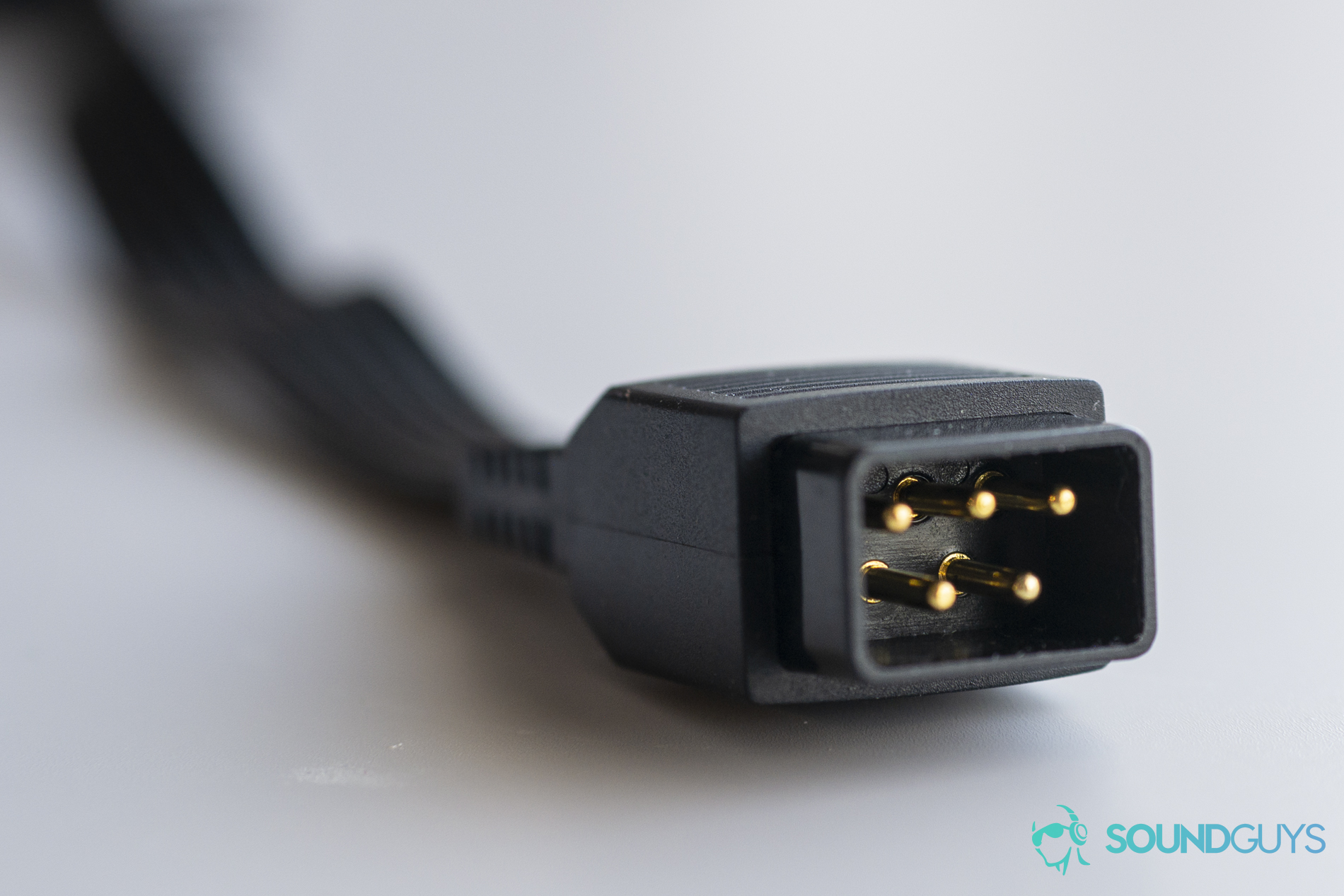
Plug the giant DC converter brick into the wall, and plug the business end of the round part into the power port on the back. Use the included 3.5mm male-to-male cable to hook up your computer’s audio output, or use the rear RCA ports. Once this is accomplished, all you need to to is plug in the headphones into the 5-pin connector (rectangle-shaped) on the front. Switch the box on, and you’re good to go.
From here, control is easy: it works just like any other headphone amp or interface. The knob on the front controls the volume for each channel, and the switch on the front turns the whole thing on or off. If you can’t tell if it’s on or off, there’s a big honkin’ green LED on the top left of the front to tell you.
The knob is split, be sure to dial in each channel
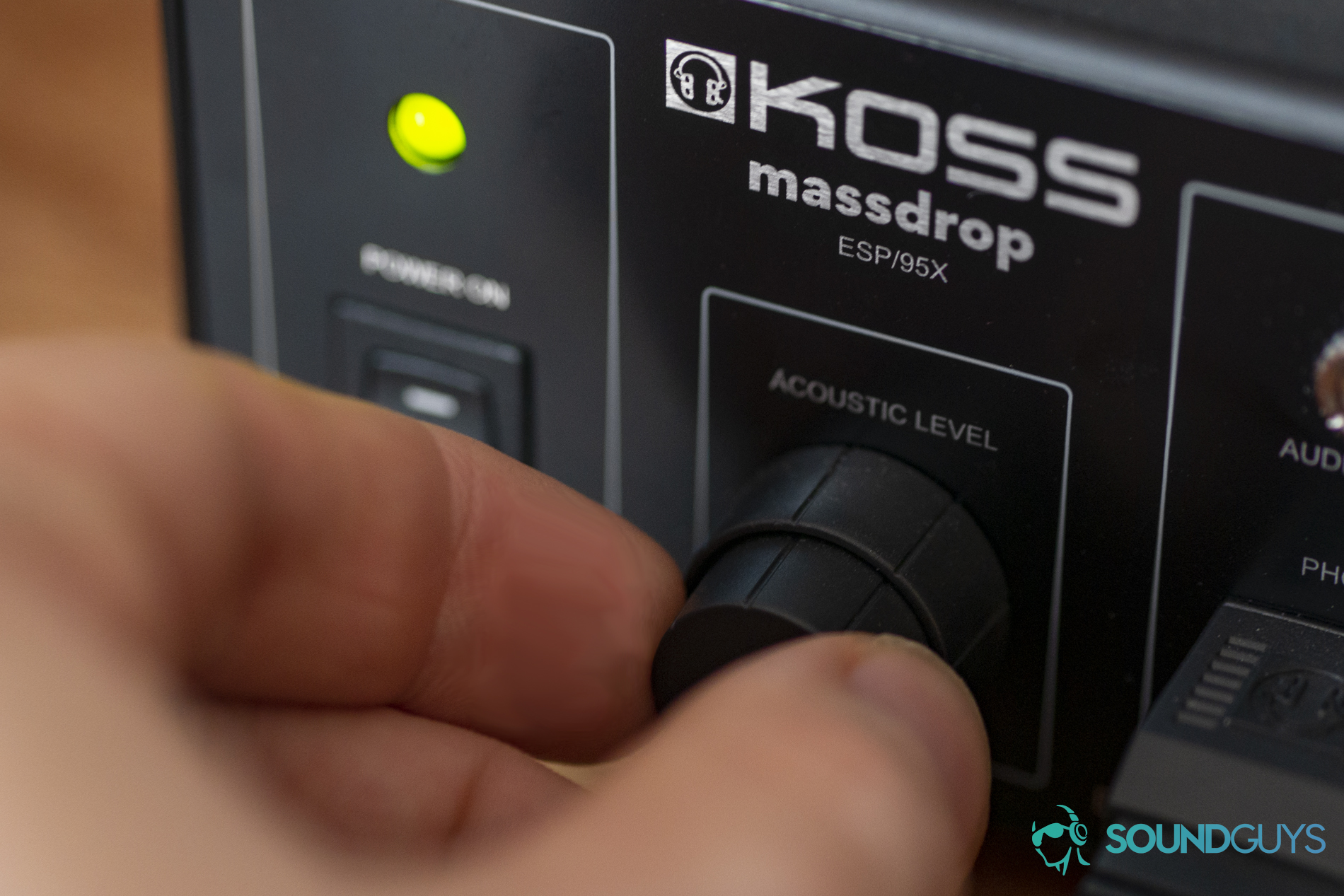
But that knob is easily the strangest thing about the Massdrop x Koss ESP/95X. Weirdly enough, each channel is separate on the volume dial, and controls the level for the left and right channels separately. Be sure to grasp the knob in a way that your fingers will move each in tandem so you’re not endlessly fiddling with it when trying to bump your tunes.
What does the Massdrop x Koss ESP/95X sound like?
It feels strange to heap praise on a set of $500 headphones that can’t go anywhere but by the computer, but electrostatic headphones are one of the very few objectively-noticeable improvements that anyone can make to their personal listening setups. The tradeoff of absolutely zero portability is paid back in sound quality, and comfort.
While it’s not exactly a “perfect” set of headphones, the truth of the matter is that it doesn’t need to be. It’s tailor-made for people looking for a mostly-flat response but a little tasteful alterations here and there that can be easily equalized away to fit your desires.
There are a few other benefits to the driver design like increased clarity, fairly short decay, and the massive earcups can encircle your entire ear. This allows for the planar waves to hit your ear much like they would in real life, so it’s easier to let your mind think the sound is coming from outside the headphones.
Should you buy the Massdrop x Koss ESP/95X?
If you can justify spending $500 on headphones, yes. Electrostatic headphones are absolutely outstanding at reproducing sound, and offer a marked improvement on just about any dynamic headphones. While these aren’t the most-revered set of electrostatic headphones out there, most people will see a marked increase in sound quality for at-computer use.
If you can justify spending $500 on headphones, yes.
Obviously, not everyone has $500 just lying around, so these have to be approached as a serious investment into a life that involves several hours a day at the computer. On a personal note: I like these a lot, and I think you will too if you’re okay with a bunch of cables on and around your desk.
Thank you for being part of our community. Read our Comment Policy before posting.